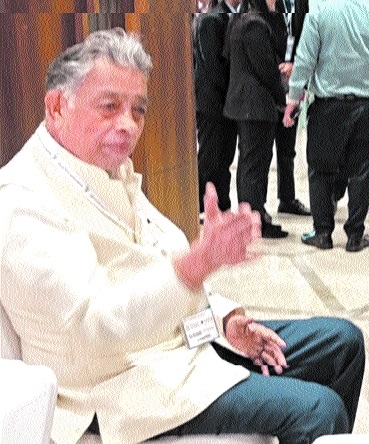Institutes need to focus on innovation: Dr Jayaram
| Date :05-Apr-2025 |

An educationist, entrepreneur, and philanthropist, Dr M R Jayaram, whose acumen and managerial capabilities brought laurels not only to his institute but also played a pivotal role in bridging the gap between institutions, policymakers, and young aspirants by identifying the challenges and solutions within Indian education system. He has been awarded an Honorary Doctorate by Coventry University, UK, for his contribution to education and business. He shared insights regarding the Indian education system with ‘The Hitavada’.
By Bhavana ‘Aparajita’
Shukla :
Q.1 Now it has been established that there is a need for quality education delivery and employability in our present system. Through this organisation (EPSI), which is non-profit, how are you going to achieve this?
A. We have identified that our education institutes can no longer restrict themselves to being centres of knowledge transfer only. Skill development has proven to be equally important. For that reason, these centres are framing their curriculum accordingly. We are in touch with industries so that courses can be customised according to employability criteria.
Q.2- There has been a growth of around 25% in the number of institutions in the last four to five years. Students opt for graduation-level courses here, but their first choice for advanced studies is still abroad. We have manpower, knowledge centres, and infrastructure. What is lacking here?
Why can’t our centres provide them with that level of learning in the country?
A- There is a need for more innovation in imparting the curriculum as per the need of the hour. As we are rapidly opening new institutes, in the last five years, the number of private colleges has increased from around 2000-2500 to 4000, and the number of universities has increased from 300 to 1200. However, there is a need to include innovation in our curriculum. For example, Artificial Intelligence has been introduced in other countries. Here, we are following and trying to catch up with them. Instead, we should pioneer such streams.
Q.3- You are the Chairman of Gokula Education Foundation (GEF) and son of Dr M S Ramaiah, one of the legendary philanthropists. Could you shed some light on how you are carrying forward your father’s legacy in social work?
A - Whenever we get a chance to deliberate and implement new measures in our education system, we come forward. We never hesitate to communicate with institute operators, students, and the government through different forums. We also have a medical college. During the pandemic period, we offered our 1400-bed hospital to the government, and people were treated at government hospital rates.
During such a tough time, money remained a secondary issue; in fact, money held no importance at all. Patients received treatment in 900 oxygenated beds at no cost. We are always ready to offer our services and infrastructure in case of such crises.
Through EPSI, our team of senior educationists, educational entrepreneurs, intellectuals, and industry leaders take up issues on behalf of the academic world with the Government and industry for quality education. We always try to play a catalytic role in promoting the growth and quality of education in India. The M S Ramaiah Charities Trust has a number of well-defined social objectives. The Trust annually awards scholarships to financially backward meritorious candidates for pursuing higher education.
Q.4- Born at the time of independence, how do you see the change in our education system in the last couple of decades?
A- Of course! There has been a change, and in the last 10-15 years, this change has been happening rapidly in the number of institutions, coupled with the inclusion of new curricula. However, the foundation for these new changes was laid around 30-32 years ago with globalisation, the increase in the number of industries, and the opening of new avenues, e.g., information technology. Today, we are reaping the fruits of those efforts and decisions were taken at policy level.







